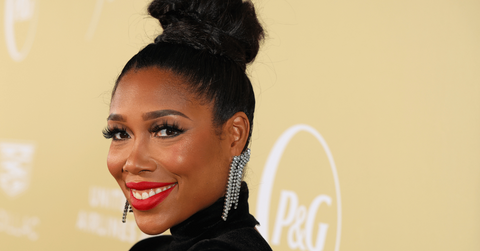Eden Bridgeman Sklenar is working to broaden the Ebony media landscape by taking the legacy brand we all grew up on to the next level.
With a desire to support the family and a focus on sustaining wealth Eden’s father Junior Bridgeman, took his career from the basketball court to the boardroom. The now-retired NBA player established Bridgeman Foods Inc. in 1988 based in Louisville, Kentucky. The family business now operates over 200 fast-food chains and family-style restaurants across the country. Eden credits her parents for the early experiences that helped her learn the business at every level from working the drive-through at the family-owned Wendy’s franchise to janitorial and file clerk shifts in the office after hours. She readily recalls those early experiences as key moments that shaped both her empathy and her work ethic.
Eden always wanted to be part of the family business in an impactful way, but all her life she was unsure exactly what that looked like. So in 2019, when news began to circulate about the opportunity to acquire Ebony after the company filed for bankruptcy Eden knew this was an endeavor she was ready for. Ebony’s mission to “Move Black Forward” brings Eden’s focus toward spotlighting Black voices while evolving the brand’s legacy to shine within a multimedia landscape.
In our conversation, Eden shares her approach to servant leadership in her role as CEO at Ebony Magazine.
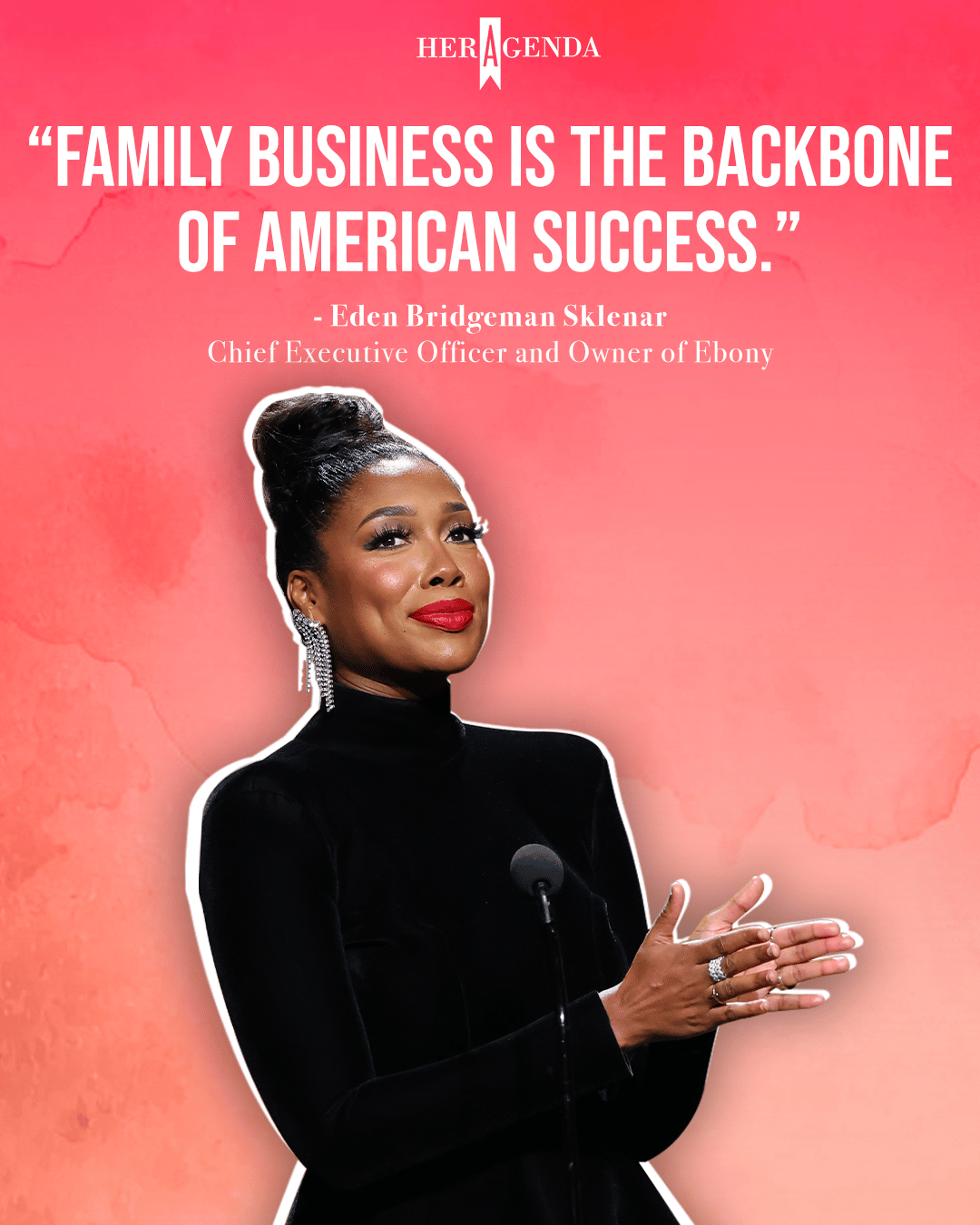
Her Agenda: In a former interview, you were quoted saying, ‘In the back of my mind, I always knew I was going to be a part of the family business.’ How are you creating your path while carrying on a prominent family legacy?
Eden Bridgeman Sklenar: I’m the youngest of three; I have two older brothers. As the youngest and the only woman, [there was a] sense of competitiveness. I always wanted to be better at anything my brothers were accomplishing. I had a unique opportunity to watch my brothers ascend and have my competitiveness with them go into the business world.
I knew I had a unique opportunity being able to witness my brothers grow into businessmen within the family business. Generational businesses aren’t something within the African American community that are as prevalent. From my standpoint, the idea [of generational] wealth is passed down, but the ability to sustain a family business itself from generation to generation is not as frequently addressed.
For me, even though I may not have known exactly what I was going to do within my family business, I knew I wanted to continue the legacy and serve as an example that others can do it too. I hope my family’s story continues to be something others feel they can do within their own families. That competitiveness with my brothers, my drive to further the legacy, and the ability of my parents to create this business from the ground up are all factors that set me on this path.
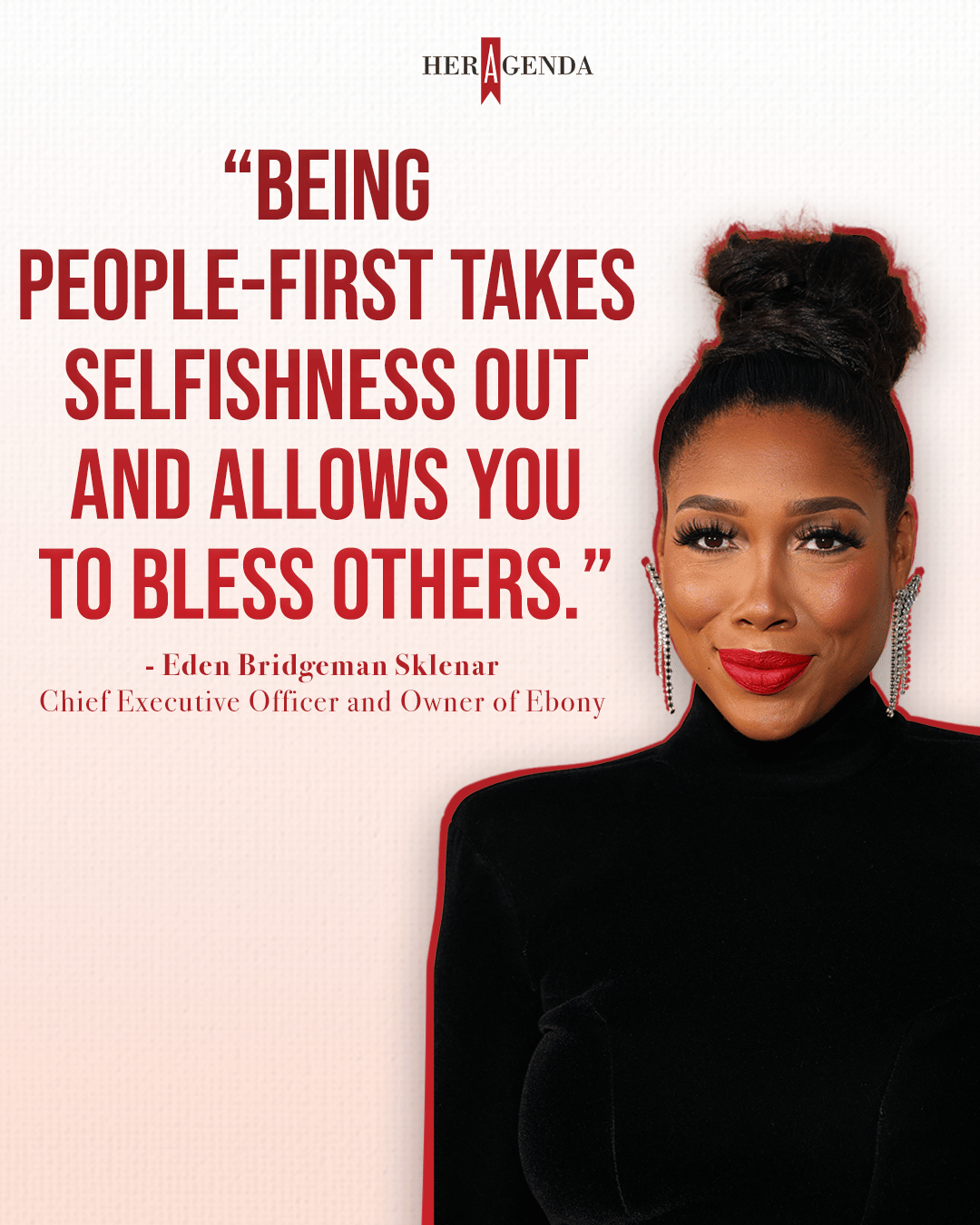
Her Agenda: What advice do you have for someone who wants to start a family business and create a good legacy?
Eden Bridgeman Sklenar: I always say that family business is the backbone of American success, not public companies. It is families working together to create opportunities for the next generation to hopefully not struggle as hard. My parents came from humble means; for them, the options, especially the idea of going to college, were still unique for people of color. You were typically going to college to be a teacher or to work at the post office. Those were the options. However, my mother got into the business. She got into management training, and my father was fortunate enough to have a height that allowed him to play in the NBA for both Milwaukee Bucks and LA Clippers for 12 years. However, he played during a time when professional basketball was not as lucrative as it is in the present day. So he had to figure out a profitable source of income for his family and a different path for retirement. His early thought process laid the groundwork for what would ultimately become known as Bridgeman Food Inc. today.
Getting into business and being a family were just the opportunities they saw for ownership. They saw the lifestyle that they wanted (and not necessarily for the cars and jewelry and all of that) when I talk about lifestyle, I mean for my siblings and me to have time with my parents because of the business. The thought was to create a family unit that remains together.
Her Agenda: How are the Ebony and Jet brands pushing the needle on upward mobility within African American culture?
Eden Bridgeman Sklenar: To me, the Ebony brand represents upward mobility. We have our Power 100 list [but] that doesn’t even begin to show all the movements, all the change makers, all the ceiling breakers within our community, that 100 is not enough, we could do millions and millions of what people are doing every day.
We had six special honorees that night that took the stage for Ebony’s Power 100—three lead actors from the now-released Wakanda Forever shared the stage with Cheryl McKissick. She is part of the fifth generation in her family’s construction and design business. Her great-great-grandfather started as a slave learning how to make bricks; [and today] they are part of the John F. Kennedy and LaGuardia airport expansions. Our people are the ones that are making it happen. For Ebony, it’s that idea of the culture, movement in business, and all the industries coming together and showcasing the upward mobility of our community that individuals like yourself are doing every day. We say all we have to do is tell the stories of what exceptional individuals are doing every day.
Her Agenda: How are the Ebony and Jet brands pushing the needle on upward mobility within African American culture?
Eden Bridgeman Sklenar: To me, the Ebony brand represents upward mobility. We have our Power 100 list [but] that doesn’t even begin to show all the movements, all the change makers, all the ceiling breakers within our community, that 100 is not enough, we could do millions and millions of what people are doing every day.
We had six special honorees that night that took the stage for Ebony’s Power 100—three lead actors from the now-released Wakanda Forever shared the stage with Cheryl McKissick. She is part of the fifth generation in her family’s construction and design business. Her great-great-grandfather started as a slave learning how to make bricks; [and today] they are part of the John F. Kennedy and LaGuardia airport expansions. Our people are the ones that are making it happen. For Ebony, it’s that idea of the culture, movement in business, and all the industries coming together and showcasing the upward mobility of our community that individuals like yourself are doing every day. We say all we have to do is tell the stories of what exceptional individuals are doing every day.
Regarding Jet, we want to reintroduce the brand with a tech focus because STEM, as we know, is such an important thing. If our community doesn’t wrap our arms around it, we will lag even further than we currently do. Culture, business, art, and fashion topics that we cover with our Ebony brand combined with the tech innovation through our Jet brand we aim to move our community forward.
Her Agenda: There was a shift in 2022’s diverse list of power 100 honorees, with an added emphasis on content creators and social media personalities that are popular among the Gen Z demographic such as Jackie Aina, Isla, and Saucy Santana, to name few. Why was it necessary to highlight so many individuals within the creator space this year as opposed to previous years?
Eden Bridgeman Sklenar: Creators are our trend setters. Just because you may be in the corporate world does not mean that your success is more valuable to our community than those with large followers like content creators. We all sit and scroll or are entertained by these creators on Instagram and other social media platforms.
We must show that we are diverse in making changes and setting the trends everywhere as a brand. The idea that creators, especially for brands like Ebony, connect more with the youth was an inevitable next step. Having those individuals you cited as part of the list showcases that Ebony represents all, not just some.
Her Agenda: According to the National Center for Education Statistics between 2018 and 2019, Black women made up 71% of master’s degrees, with some studies showing that Black women are the most educated group in the U.S. You received your master’s degree in entrepreneurship and entrepreneurial studies. In what ways did obtaining a degree in higher education prepare you to take on your current role as CEO?
Eden Bridgeman Sklenar: We always have to be learning. Every day is a school day. I have to continually learn. My undergrad years prepared me up to a point and getting my MBA helped refine the skills we must constantly build. It’s important to build on your skillset. The world is constantly changing. If you’re not learning or adapting, you’re going to find yourself obsolete.
Her Agenda: From your perspective, working within the corporate arena for over 15 years, how have you navigated being a young CEO, and gaining respect across all levels of the business?
Eden Bridgeman Sklenar: Nothing was given. Oftentimes when people think of family and business they think of nepotism. However, my parents made sure my siblings and I had to learn the business and earn our spot within the business like everybody else. Our family business started out with owning different restaurant concepts. [My siblings and I] worked in the restaurants; we weren’t in management to start; we were dropping fries and working the drive-thru cash register at Wendy’s and then dinette. I’ve transitioned from there to being a janitor in the home office, where we would come in once everyone had left and cleaned the office. I was a file clerk. We had to do all the positions, and all the steps, and slowly work our way up.
I also think of my youth as a benefit. Although I have years of experience, I’m open and still learning and understanding. Surrounding myself with much smarter individuals than myself is the right way to position myself on the team. I like to lead with servant leadership; the idea that I am of service to every single employee allows me to effectively guide them, regardless of [whether or not] some are older or some are the same age as me. With my current management style, I can have the success I’ve had thus far.
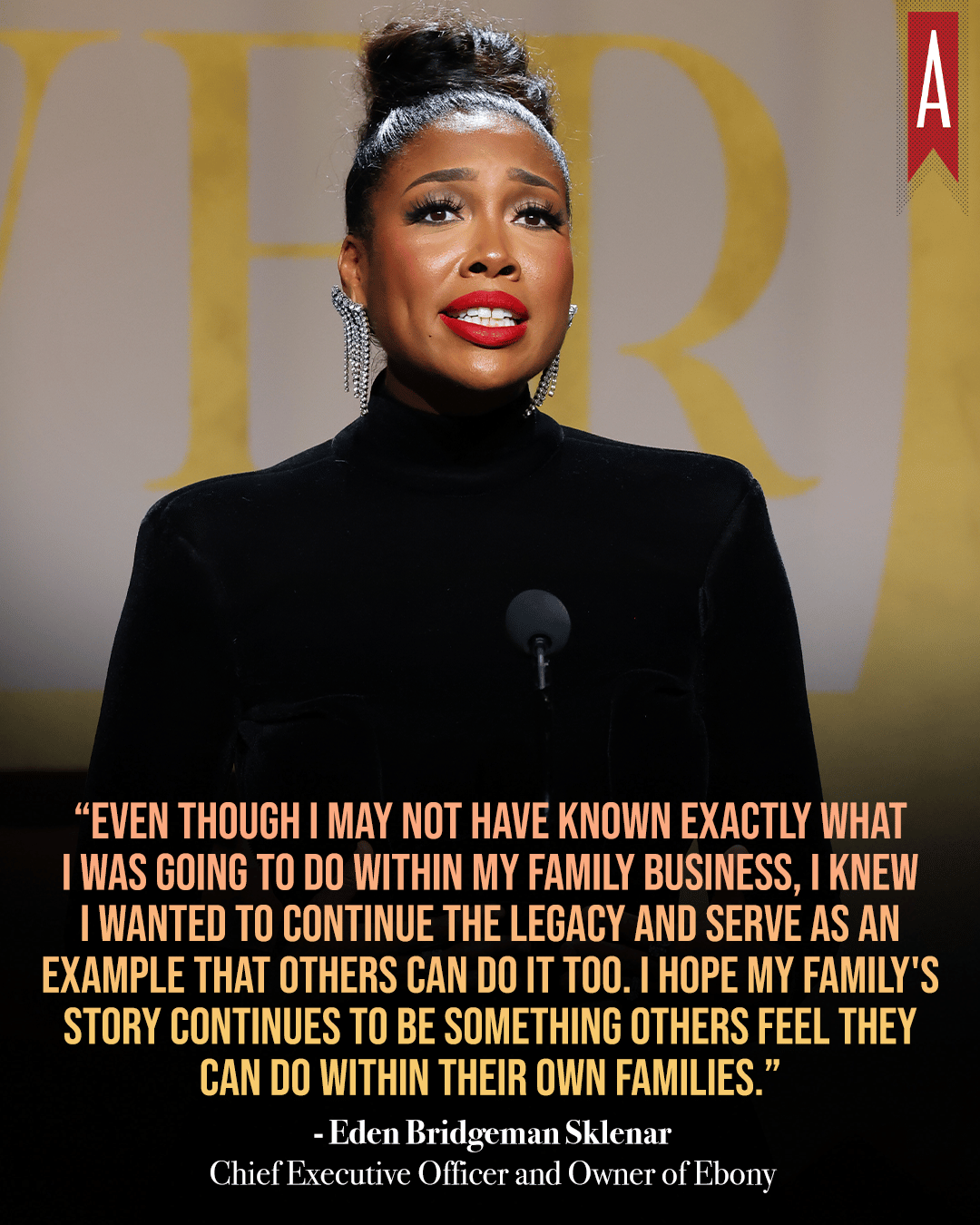
Her Agenda: As a leader, you’re required to navigate making tough decisions. What was one of the most important lessons you learned in saying no?
Eden Bridgeman Sklenar: It’s honestly just okay to say no. So many times, leaders fear the word no because they’re afraid that employees will quit. Trying to staff a company is not easy. You want to connect with your workforce and show them that you believe in them but must make tough decisions when needed.
I think many times, leaders can be too aggressive, for lack of better words, with their no. And so, for me, it’s the idea. I have to be consistent after the no to show that I have a path forward that is still beneficial for them. I don’t steer away from the hard conversations. I know, I can’t just say no and say, ‘well, it’s because I said, so.’ That’s not effective. I have to give a pathway forward for that no to make sense over time to that employee. When we say no, for Ebony, we’re not going to be salacious; we’re not going to gossip, even though it may drive more impressions and give me more clicks.
Her Agenda: Congratulations on Ebony’s Return of the 2022 Power 100. In what ways did the award ceremony pay homage to the past of the Ebony brand, while also highlighting what’s to come for the future of the multimedia entity?
Eden Bridgeman Sklenar: It was a unique opportunity. We had two main stars that played Mamie and Emmett Till in attendance that night.The mothers of Ahmuad Aubrey and Breanna Taylor accepting the Social Justice Award both symbolized moments of coming together. Those mothers advocating for the justice of their children to the actors portrayed in the movie telling the stories that make up the fabric of who we are as a race are examples that showcase the power of Ebony Power 100. The event served as an opportunity to create a safe space to highlight the achievements the black community has made so far while reminding us of our history. It was a chance for our community to come together around a continual fight.We could cry, laugh, and celebrate our community’s beauty while moving through the hard moments together. Having all of that within one room is why I love Ebony Power 100.
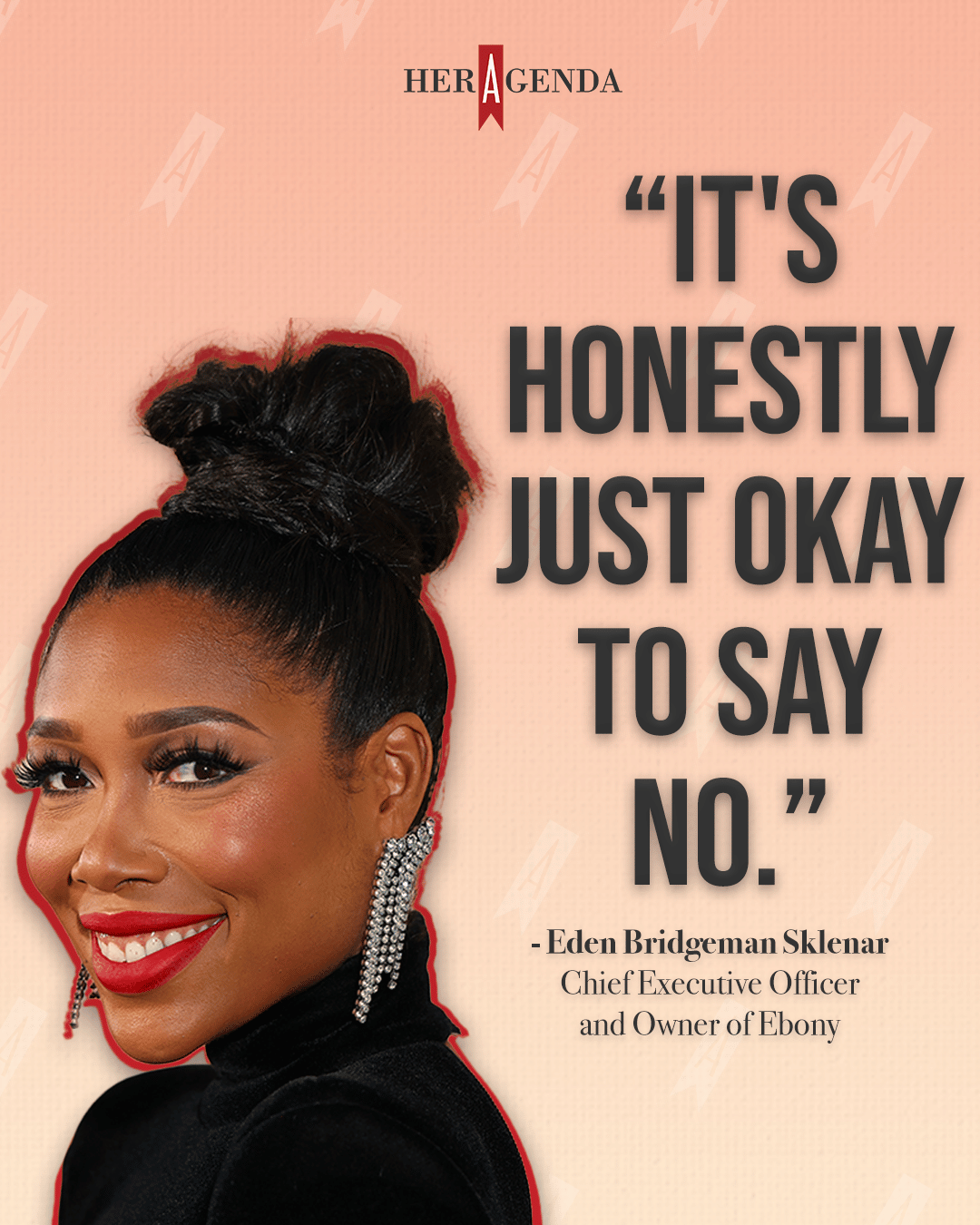
Her Agenda: What is your motto?
Eden Bridgeman Sklenar: My motto is really about being people first. It’s something that we say within our family and within our family business because if you are people first, everything else will fall in place. The business success will come because if your employees and customers are treated in a certain way, they will return to you. Same thing with your family, if I am of service to my family, that will hopefully keep my family unit as I create my own family. Being people-first takes selfishness out and allows you to bless others.
[Editor’s note: This interview has been edited for length and clarity.]

